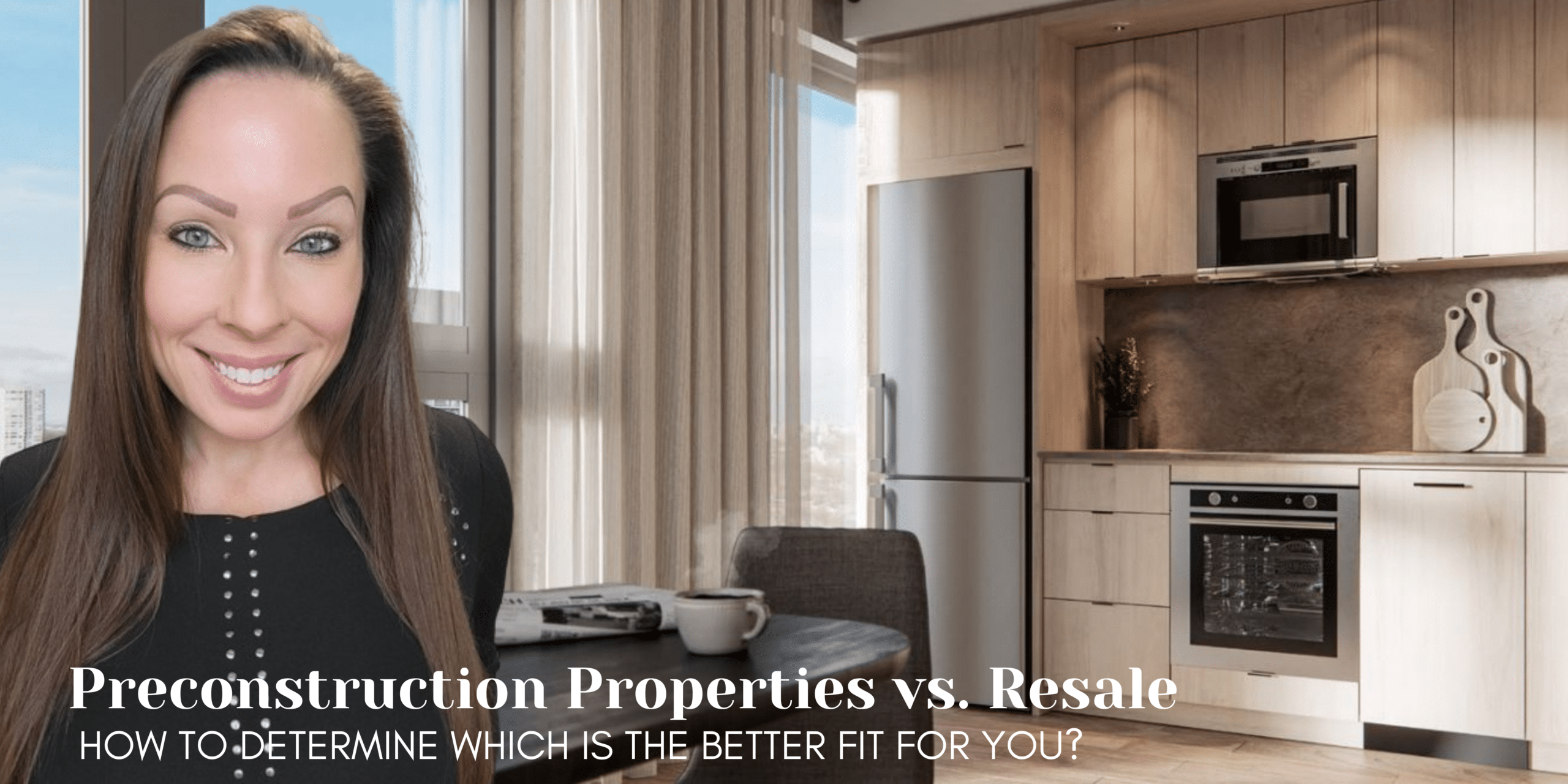
Preconstruction homes vs. residential resale – which is better for you? If you’re new to real estate, you could be wondering this question.
It’s an age old question and fortunately for you, I’m here to help you answer this for yourself with a guide that outlines some of the pro’s and con’s of preconstruction homes vs. residential resale properties.
To kick things off, let’s consider some of the advantages of pre-construction.
CUSTOMIZATION: when you’re on the hunt for a new home, you could be stuck with the decisions, style and taste of the previous home owner, at least until you can find the time and/or money to renovate or remodel for yourself. If you’re looking at pre-construction properties, then one of the best facets is the option to customize most things from the layout to the finishes. Essentially, you’re creating the home of your dreams that is perfectly customized to your taste.
FIXED PRICING: if you’re buying a preconstruction property – it’s safe to say you know you won’t be moving in for awhile. This said, the developer needs to offer buyers a fixed price even when a project won’t be ready for a year, or a few years. That means, even if the real estate market suddenly has a huge lift in home prices, the cost that you lock into your contract can’t change. You’re not only buying a beautiful home, but in most cases, it will be worth much more once it’s completed. Let’s just say, this is a great way to play the “long game” in real estate.
LITTLE TO NO MAINTENANCE: if you’re buying a brand new preconstruction property, you should expect little to no maintenance. If you’re buying a preconstruction condo, then there really is none; if it’s a house, you could be waiting a little while for grass or fencing, but there shouldn’t really be any maintenance in the way of repairs since everything in the home will be installed brand new.
STAGGERING OUT YOUR DOWNPAYMENT: unlike residential resale, since many (or even most) preconstruction properties are builder financed, you may have more flexibility when it comes to qualifying for financing. In addition, one of the major perks is staggering out your downpayment since payments are typically spread out over the course of several phases. You may be looking at 5% down upon signing then another 5% over a few more periods, prior to the property’s completion and closing. Saving up such a considerable sum of money for your first home can be challenging, so some people feel this is easier for them.
Now that you’re aware of a few of the top advantages of buying a pre-construction condo, let’s look at some of the positive points associated with residential resale properties.
YOU GET WHAT YOU SEE: this doesn’t mean that the property you buy preconstruction is not what you expect, but since you’re buying something based on floor plans and concept illustrations, in some cases, it may not turn out exactly the way you thought it would. Maybe it’s not as spacious as you hoped it would be, for example. When it comes to residential resale, there is no guessing involved and any unwanted surprises are at a minimum.
IMMEDIATE OCCUPANCY: depending on your personal situation, you may need to move into your new home sooner rather than later. When you’re buying a residential resale home instead of a preconstruction property, you can have confidence of knowing when you’ll move in – and in most cases, this isn’t very long after an offer is accepted. For the majority of buyers, this could be as little as a few weeks to as long as a few months, which is considerably less than 1-3+ years when you’re looking at preconstruction properties.
OPTIONS: when it comes to residential resale, you know that you can do whatever you please with it once you take possession. If you’re buying a resale condo, then you could be subject to the condo board’s bylaws, rules and regulations (which you’ll be aware of before buying) but overall, this means you can move in, rent it or resell it right aware.
The above are a few of the advantages of buying preconstruction properties or residential resale. Now, let’s take a closer look at what the disadvantages could be for you. We will start again with preconstruction properties.
WAITING: the biggest challenge when it comes to preconstruction properties, especially preconstruction condos, is the possibility of delays. While yes, it’s a well-known fact that the earlier you finalize your transaction, the more money you can save in the long run but the sooner you do so could also mean the longer you’re waiting until it’s completed, assuming that it closes on time. If you need or want to move in immediately, then preconstruction properties probably shouldn’t be for you.
BUYING THE UNKNOWN: ok, well not completely unknown. Of course you’re making this purchasing decision based on pictures and floor plans, but the reality is that you won’t be seeing the finished product until a year to several years after signing the agreement. Since you can’t see the finished product before buying it, there is always some element of uncertainty associated, at least to some extent.
These are the top disadvantages for preconstruction homes. Now let’s go over a few of those that apply to residential resale.
NO CUSTOMIZATION: unlike preconstruction homes, you can’t exactly ask a seller to change anything prior to taking possession. If there are any apparent flaws or issues with the property, then you may be able to negotiate some changes or fixes, but when it comes to the general aesthetic, that will be up to you after closing. Barring any renovations you decide to invest in after the fact, what you see is literally what you’ll get..jpg)
WEAR AND TEAR: when you’re purchasing a residential resale property, you can expect some general wear and tear. It’s strongly recommended that you invest in a thorough home inspection to identify any possible issues before you move forward. Replacing the roof or furnace shortly after taking possession would be very costly. It’s important to know what you’re getting yourself into so you don’t find yourself in a situation you can’t manage or afford after closing. When it comes to the look and feel inside and out, as long as everything else is functional, then any other repairs or renos, may simply be to meet your taste.
At the end of the day, whether you decide to invest in a preconstruction property or residential resale, it’s important to think of the big picture so you can make the best decision for yourself in the long term. What is best really depends on your personal finances and situation.
Are you in the market to buy a new home? I have plenty of information available on preconstruction properties in the city as well as residential resale homes in Durham Region as well as Toronto. Let’s talk! I can be reached at 647.896.6584, by email at info@serenaholmesrealtor.com or with this simple contact form.
For other great updates and tips, make sure we’re connected on social and you’ve subscribed to my YouTube channel.











